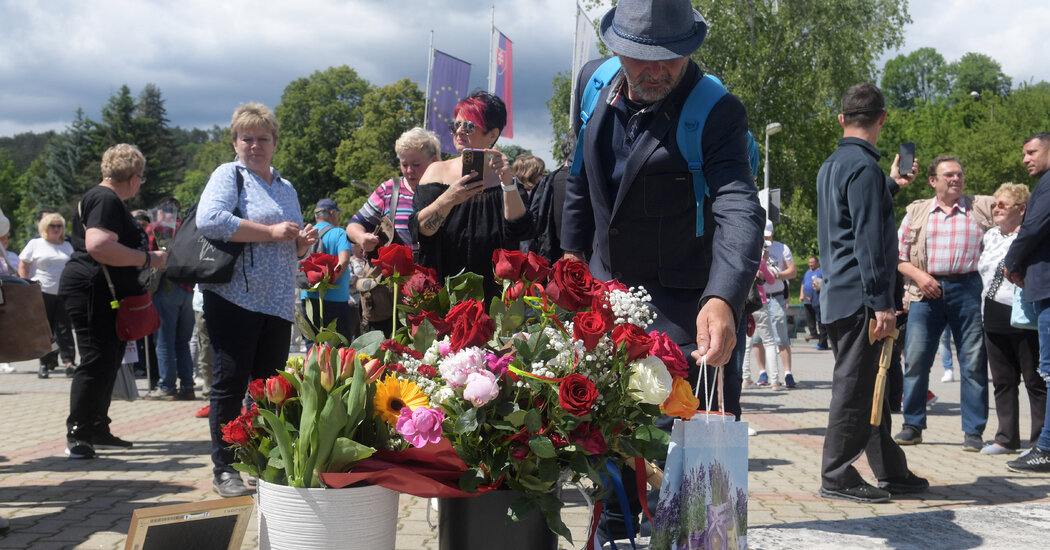More than a week after being shot in an assassination attempt, Slovakia’s prime minister was still hospitalized in serious condition on Thursday, as calls for political unity after the attack have given way to a resurgence of hostility in the polarized Central European nation.
Prime Minister Robert Fico was shot multiple times at close range on May 15 in the town of Handlova in central Slovakia. The attempted assassination — the most serious attack on a European leader in decades — sent shock waves through Europe.
Mr. Fico has undergone several surgeries since the shooting, and on Thursday the government said his condition “remains serious but stable” at a hospital in the central city of Banska Bystrica.
Even before Mr. Fico was shot, Slovakia was deeply divided between backers of his right-wing nationalist and anti-immigration policies, and opponents who accuse him of eroding democracy. The shooting prompted pleas from Slovakian officials for political parties to urgently reduce tensions — with some going so far as to warn about the risk of civil war.
But the attempts to lower the temperature appear to have fallen flat as the country returns to politics as usual.
Much of the hostility has centered around a divisive bill the government is pushing in Parliament that would give it control over the public broadcaster.
Mr. Fico, whose government has been accused by its critics of stoking tensions and antagonizing the media, had sought an overhaul of the broadcaster to purge what his party views as unfair bias in favor of its political opponents.
That legislation was part of a raft of measures — including moves to limit corruption investigations and impose what critics denounced as Russian-style restrictions on nongovernmental organizations — that the European Commission in February said risked doing “irreparable damage” to the rule of law in Slovakia.
The bill was up for debate in Slovakia’s Parliament on the day Mr. Fico was shot. The attack prompted a suspension of Parliament, which resumed this week.
Its first order of business, on Tuesday, was to approve a resolution condemning the attack on Mr. Fico and urging political parties and the media not to “spread hatred.”
On Wednesday, Parliament took up the draft bill about the broadcaster. It passed a first reading — with 77 lawmakers voting in favor and 53 voting against. The legislation still must be approved in at least one more reading and signed by the president before it can become law.
Michal Simecka, the chair of the opposition Progressive Slovakia party, had welcomed calls by the government to pause campaigning for the elections next month for the European Parliament to “calm the situation.” But he attacked Mr. Fico’s government over the bill, which he called a “bad law” that “goes against the interest of the public and against European rules.”
He urged the government to withdraw the proposed legislation and “stop the dangerous effort” to control Slovakia’s television and radio.
Zuzana Caputova, the country’s departing president, and Peter Pellegrini, who will replace her in June, had made a public show of inviting leaders from Slovakia’s main political parties for a meeting to “calm down the situation.”
The last few days “have shown that some politicians are simply incapable of basic self reflection even after such huge tragedy,” Mr. Pellegrini said Sunday in a lengthy video posted on social media, without naming names. “As if they fail to understand that their past actions, their statements and disgusting attacks — not on political ideas but on their proponents — have significantly contributed to the tension in our society.”
The meeting was eventually canceled this week “due to the publicized statements of some leaders,” according to local news media.
The interior minister, Matus Sutaj Estok, has insisted that the government is committed to building political peace — but he signaled on Thursday that old grudges would not be forgotten.
“We do not want to escalate the tension within society. But we will certainly not forget what has led us to this state,” he wrote in a post on Facebook, in what appeared to be an attack against the government’s critics.
Opponents of Mr. Fico — who began his three-decade political career on the left but along with his party, Smer, has embraced right-wing political views over the years — have described some of his plans as attempts to return Slovakia to repressive Soviet times.
Mr. Fico had previously served as prime minister from 2006 to 2010 and from 2012 to 2018, when he was ousted amid street protests over the killing of a journalist who was investigating government corruption. He defied expectations and returned to the premiership last year, mounting a remarkable comeback after campaigning on pro-Russian stances, and promising social conservatism, nationalism and generous welfare programs.
The Slovakian authorities have released little information about the assassination attempt, other than to say it was carried out by a man with political grievances who had been radicalized after the most recent presidential election.
A 71-year-old suspect, identified by the authorities only as Juraj C., will face charges of attempted premeditated murder. He appeared before a judge for a closed hearing on Saturday in Pezinok, a city in western Slovakia, and was remanded in custody. On Thursday, Slovakia’s general prosecutor declined to say when the suspect would next appear in court.
Cassandra Vinograd reported from London and Sara Cincurova from Bratislava, Slovakia
